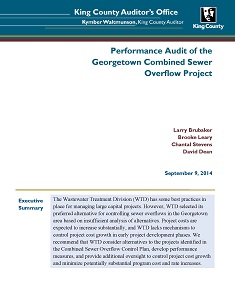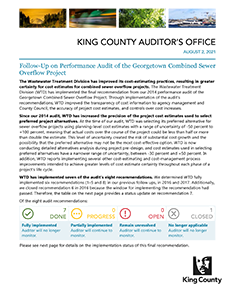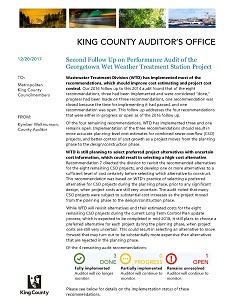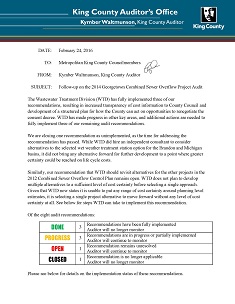Performance audit of the Georgetown combined sewer overflow project
September 9, 2014
NEW! Download the latest follow-up report
The Wastewater Treatment Division (WTD) has some best practices in place for managing large capital projects. However, WTD selected its preferred alternative for controlling sewer overflows in the Georgetown area based on insufficient analysis of alternatives. Project costs are expected to increase substantially, and WTD lacks mechanisms to control project cost growth in early project development phases. We recommend that WTD consider alternatives to the projects identified in the Combined Sewer Overflow Control Plan, develop performance measures, and provide additional oversight to control project cost growth and minimize potentially substantial program cost and rate increases.
Status
Of the eight recommendations:
| DONE | 7 | Recommendations have been fully implemented. Auditor will no longer monitor. |
|---|---|---|
| PROGRESS | 0 | Recommendations are in progress or partially implemented. Auditor will continue to monitor. |
| OPEN | 0 | Recommendations remain unresolved. Auditor will continue to monitor. |
| CLOSED | 1 | Recommendation is no longer applicable. Auditor will no longer monitor. |
Summary
The County Council has been concerned about the cost growth of the combined sewer overflow (CSO) program, as planning-level estimates provided to the County Council in the 2012 CSO Control Plan were double previous planning-level estimates. This audit of the Georgetown CSO project focuses on how the Wastewater Treatment Division manages projects in the early development phase when significant cost growth has occurred on CSO projects in the past.
WTD is experienced in managing large capital projects and follows some best practices. However, WTD selected wet weather treatment as the final alternative for controlling sewer overflows in the Georgetown area based on imprecise cost estimates and insufficient analysis of other alternatives. Early indications are that costs are likely to grow substantially for the Georgetown project. Further, the alternative WTD selected for the Georgetown project presents inherent risks that could add substantially to project costs. These issues raise significant questions about whether WTD selected a cost-effective alternative.
WTD’s planning-level cost estimation process needs improvement and King County faces potentially significant increases on projects in its CSO program, including the Georgetown project. For instance, project costs on four ongoing CSO projects have grown by 47 to 533 percent since WTD provided planning-level cost estimates to decision-makers. If final costs for projects in the 2012 CSO Control Plan exceed planning-level estimates by the same margin, the total cost of the program could be approximately $2.6 billion, substantially higher than the $711 million program cost presented in the 2012 CSO Control Plan.
Projects specified in King County’s CSO consent decree with the Department of Justice were selected based on less analysis than is typical for projects of this magnitude. However, it may be possible to modify the terms of the consent decree to increase project benefits and reduce project costs.
To help ensure cost-effective action on the part of WTD, we recommend that WTD conduct additional analysis of alternatives for controlling sewer overflows and create performance measures and other mechanisms for better controlling project cost growth during early project development phases.
Reports related to this audit
Click on the image(s) below to view related reports.
|
January 17, 2017 |
Audit team
Larry Brubaker, Brooke Leary, Chantal Stevens, and David Dean conducted this audit. If you have any questions or would like more information, please call the King County Auditor's Office at 206-477-1033 or contact us by email KCAO@kingcounty.gov.

 Translate
Translate




